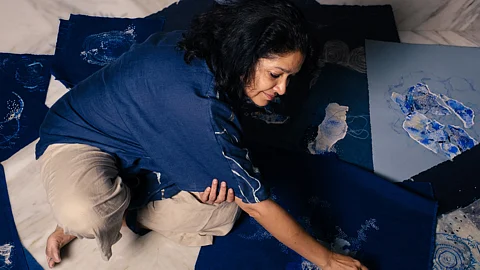
- HOMEGROWN WORLD
- #HGCREATORS
- #HGEXPLORE
- #HGVOICES
- #HGSHOP
- CAREERS
- ABOUT US
- CONTACT US

Once known as 'blue gold', indigo has a fraught history marked by resistance and resilience in India. It was a significant export of British colonial India, cultivated through exploitative systems of forced labour to produce the highly sought-after natural dark blue dye. In 19th-century Bengal, ryot or tenant farmers were coerced into growing indigo under brutal conditions. The 1859 Indigo Rebellion (Nil Bidroha in Bengali) was a historical peasant uprising in which the peasant farmers rose against British indigo planters, refusing to sow the indigo crop and challenging imperial tyranny.
Gurgaon-based visual artist Radhika Surana engages with this fraught history by consciously incorporating indigo vat dyeing into her work. Surana's debut solo exhibition, 'Somewhere I Have Never Travelled', features a body of textile-based works that use embroidery and natural dyeing techniques, specifically indigo vat dyeing, to explore ideas of memory, connection, and repair.
By reclaiming indigo in her embroidery, Surana engages directly with its colonial history. This material once associated with forced labour and exploitation, becomes, in her work, a means of reflection and agency. The process of vat dyeing — a labour-intensive process reliant on deep, alchemical knowledge — becomes an act of rootedness, an aesthetic return to indigenous ways of making.
Surana's intentional use of embroidery — a practice historically linked to domestic work and gendered labour — extends the political scope of the exhibition. The textile works are understated but evocative. French knots cluster like lichen, referencing symbiotic growth and interdependence. The seed stitch appears repeatedly, suggesting cycles of regeneration. In several works, the fabric is torn, scorched, or marked — gestures that hint at rupture and trauma but also the possibility of repair. Surana makes no attempt to conceal these marks; instead, she makes them central to the narrative. By employing these techniques, she raises important questions about how labour is remembered, how care is performed, and what histories are embedded in everyday materials.
About the Artist:
Radhika Surana is a visual artist based in Gurugram, working primarily with textiles and natural indigo. Her embroidery-based practice explores the emotional complexity of human relationships through knots, burns, layers, and mends, using thread as metaphor. Formerly a practicing vocalist, Surana's early works interpreted movement through the lens of Hindustani classical music. In recent years, she has developed a deeply symbolic, process-driven engagement with cloth and stitching. Follow Radhika Surana here.
Exhibition Details:
Title: Somewhere I Have Never Travelled
Venue: Art Alive Gallery, New Delhi
Preview: Friday, 25th July, 2025
On View: Until 20th August, 2025
Timings: Monday to Saturday, 11 AM – 7 PM
For more information, follow Art Alive Gallery.
